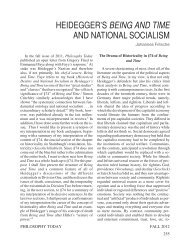Why Saying “I'm Sorry” Isn't Good Enough: The Ethics of Corporate ...
Why Saying “I'm Sorry” Isn't Good Enough: The Ethics of Corporate ...
Why Saying “I'm Sorry” Isn't Good Enough: The Ethics of Corporate ...
Create successful ePaper yourself
Turn your PDF publications into a flip-book with our unique Google optimized e-Paper software.
<strong>Ethics</strong> <strong>Corporate</strong> Apologies<br />
analogous to one Aristotle makes in his Rhetoric. Someone who can find the available<br />
means <strong>of</strong> persuasion in every given case is a good rhetorician. But it does not follow that<br />
the rhetorician will be able to convince under all circumstances. Rather he is in a<br />
situation similar to that <strong>of</strong> the physician: the latter has a complete grasp <strong>of</strong> his art only<br />
if he neglects nothing that might heal his patient, though he is not able to heal every<br />
patient. Similarly, the rhetorician has a complete grasp <strong>of</strong> his method, if he discovers<br />
the available means <strong>of</strong> persuasion, though he is not able to convince everybody (Rap,<br />
2010, 1).<br />
<strong>The</strong> recent explosion in corporate apologies poses its own challenges for executives<br />
trying to make amends. As Adams (2000) observed more than a decade ago, CEOs now<br />
love to say “I’m sorry.” If audiences begin to perceive corporate apologies as pro forma,<br />
these listeners may dismiss all executive apologies as mere ritual theater, regardless <strong>of</strong><br />
how well they crafted and ethically good they are.<br />
Lastly, there are a host <strong>of</strong> factors whose impact on perceived trustworthiness has only<br />
begun to be researched and whose impact on audience reception <strong>of</strong> an apology may or<br />
may not be significant when combined with all <strong>of</strong> the other elements discussed above.<br />
For example, women who wear light makeup designed to make their lips and eyes stand<br />
out relative to their skin may be deemed more competent and trustworthy than women<br />
who wear either no makeup or heavy makeup (Louis, 2011). Executives with “baby<br />
faces” are apparently spontaneously judged to be more trustworthy (Gorn et all, 2008).<br />
<strong>The</strong> appearance <strong>of</strong> the apologizing CEO likely does matter, but would having a baby face<br />
suffice to make this corporate apology believable if he or she did not show any empathy<br />
44

















